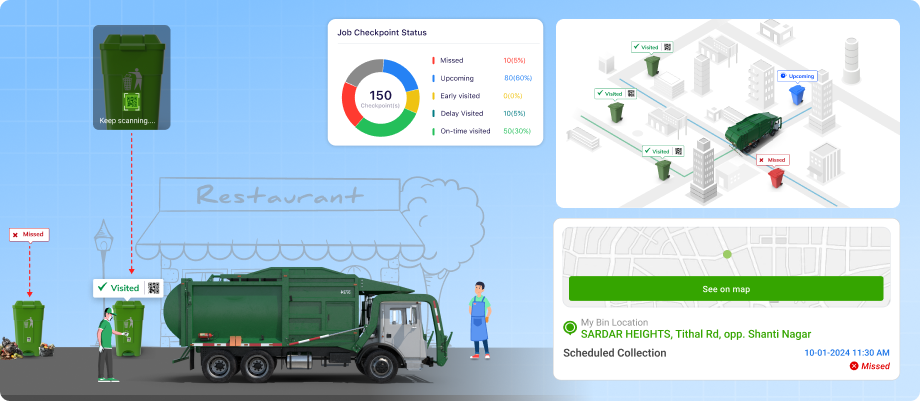Waste collection fleets operate daily across residential and commercial zones. But without proper visibility and control, issues like missed bins, delays, and unverified dumping become common. These challenges disrupt service consistency, reduce operational accountability, and often lead to citizen complaints or regulatory penalties.
Improving daily waste collection with accurate fleet visibility
Introduction
Challenges
- Bins are skipped but go unreported: Drivers may skip a bin due to blocked access, time pressure, or oversight. Since there is no confirmation method at each pickup point, managers cannot tell which bins were collected and which were left out. This leads to missed service, overflowing bins, and public complaints without clear accountability.
- No visibility on waste unloading points: In some cases, drivers may dump waste at unapproved locations to save time or avoid traffic. Without proper monitoring of where the vehicle stops and unloads, the actual dumping site cannot be confirmed. This raises issues with environmental compliance and increases the risk of fines.
- No clarity on shift-wise performance: Waste collection fleets usually run in multiple shifts across different zones. But when shift data is not separated, it becomes difficult to track what each team has done. Supervisors are left guessing which areas were covered, and there’s no clear performance comparison between shifts.
- Vehicle halts do not match the collection points: Drivers may stop for breaks or unrelated reasons while on duty. When these halts are not aligned with mapped bin locations, it creates confusion. Managers cannot tell if the halt was for collection, personal use, or due to road issues, which affects overall route performance.
- No reliable way to handle service complaints: If a citizen reports a missed bin or late collection, managers often have no solid proof to investigate. Without images, timestamps, or location data, it becomes difficult to verify what happened on the ground. This weakens public trust and limits the ability to respond quickly to issues.
Solution
- Live tracking of bin-wise collection: All assigned bins are mapped digitally in the system. As vehicles follow their route, each bin is marked when visited. Managers can monitor bin-wise progress in real time. Drivers may also scan QR codes or upload photos at key points, adding extra confirmation where needed.
- Auto-verification of waste dumping points: The system tracks the full route of every collection vehicle, including where the trip ends. If a vehicle finishes its route at an unauthorized location, the system can flag the issue. This ensures that dumping only happens at assigned disposal sites, reducing the risk of non-compliance.
- Collector and Helper performance monitoring: Each waste collector and helper uses the Collector app during their shift. The app records their route, start and end times, and every bin collected. This gives supervisors clear insights into individual performance, route completion, and any delays that happen during specific shifts.
- Break and halt monitoring: The platform logs every halt made by a collection vehicle. These halts are matched with mapped bin points to confirm if the stop was made for collection. If the vehicle stops at a location where no bin exists, or if it remains idle for too long, managers can review and take action. This helps reduce fuel waste, idle time, and route deviations.
- Use the Citizen app and collection records to resolve complaints: Citizens can raise complaints through the Citizen app if a bin is not collected or if the service is delayed. Managers can then review the driver’s route replay, bin visit logs, and any uploaded photo proofs to check whether the complaint is valid. This helps resolve issues quickly with accurate records.
Results
- Over 95% bin collection compliance: Supervisors can now confirm pickups for each mapped bin using real-time logs and location data, resulting in fewer missed bins and stronger field performance.
- Better control over team performance: With collector-wise tracking and shift-level reports, managers can identify delays, compare team efficiency, and improve daily planning with accurate data.
- Complaint closures reduced by 60%: Access to service proofs, route history, and citizen app feedback helps resolve public complaints faster and with confidence.




